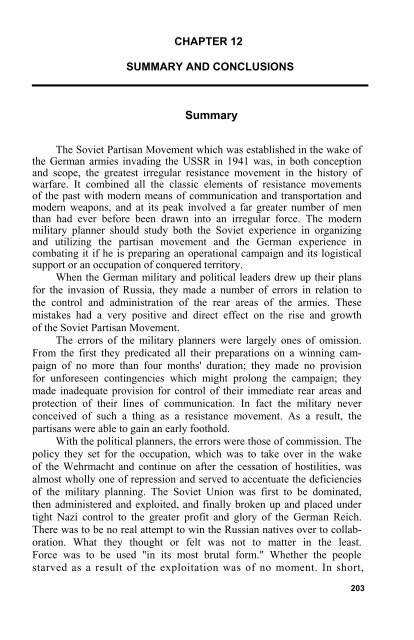the soviet partisan movement 1941-1944 by edgar m. howell
the soviet partisan movement 1941-1944 by edgar m. howell
the soviet partisan movement 1941-1944 by edgar m. howell
You also want an ePaper? Increase the reach of your titles
YUMPU automatically turns print PDFs into web optimized ePapers that Google loves.
CHAPTER 12<br />
SUMMARY AND CONCLUSIONS<br />
Summary<br />
The Soviet Partisan Movement which was established in <strong>the</strong> wake of<br />
<strong>the</strong> German armies invading <strong>the</strong> USSR in <strong>1941</strong> was, in both conception<br />
and scope, <strong>the</strong> greatest irregular resistance <strong>movement</strong> in <strong>the</strong> history of<br />
warfare. It combined all <strong>the</strong> classic elements of resistance <strong>movement</strong>s<br />
of <strong>the</strong> past with modern means of communication and transportation and<br />
modern weapons, and at its peak involved a far greater number of men<br />
than had ever before been drawn into an irregular force. The modern<br />
military planner should study both <strong>the</strong> Soviet experience in organizing<br />
and utilizing <strong>the</strong> <strong>partisan</strong> <strong>movement</strong> and <strong>the</strong> German experience in<br />
combating it if he is preparing an operational campaign and its logistical<br />
support or an occupation of conquered territory.<br />
When <strong>the</strong> German military and political leaders drew up <strong>the</strong>ir plans<br />
for <strong>the</strong> invasion of Russia, <strong>the</strong>y made a number of errors in relation to<br />
<strong>the</strong> control and administration of <strong>the</strong> rear areas of <strong>the</strong> armies. These<br />
mistakes had a very positive and direct effect on <strong>the</strong> rise and growth<br />
of <strong>the</strong> Soviet Partisan Movement.<br />
The errors of <strong>the</strong> military planners were largely ones of omission.<br />
From <strong>the</strong> first <strong>the</strong>y predicated all <strong>the</strong>ir preparations on a winning campaign<br />
of no more than four months' duration; <strong>the</strong>y made no provision<br />
for unforeseen contingencies which might prolong <strong>the</strong> campaign; <strong>the</strong>y<br />
made inadequate provision for control of <strong>the</strong>ir immediate rear areas and<br />
protection of <strong>the</strong>ir lines of communication. In fact <strong>the</strong> military never<br />
conceived of such a thing as a resistance <strong>movement</strong>. As a result, <strong>the</strong><br />
<strong>partisan</strong>s were able to gain an early foothold.<br />
With <strong>the</strong> political planners, <strong>the</strong> errors were those of commission. The<br />
policy <strong>the</strong>y set for <strong>the</strong> occupation, which was to take over in <strong>the</strong> wake<br />
of <strong>the</strong> Wehrmacht and continue on after <strong>the</strong> cessation of hostilities, was<br />
almost wholly one of repression and served to accentuate <strong>the</strong> deficiencies<br />
of <strong>the</strong> military planning. The Soviet Union was first to be dominated,<br />
<strong>the</strong>n administered and exploited, and finally broken up and placed under<br />
tight Nazi control to <strong>the</strong> greater profit and glory of <strong>the</strong> German Reich.<br />
There was to be no real attempt to win <strong>the</strong> Russian natives over to collaboration.<br />
What <strong>the</strong>y thought or felt was not to matter in <strong>the</strong> least.<br />
Force was to be used "in its most brutal form." Whe<strong>the</strong>r <strong>the</strong> people<br />
starved as a result of <strong>the</strong> exploitation was of no moment. In short,<br />
203
















